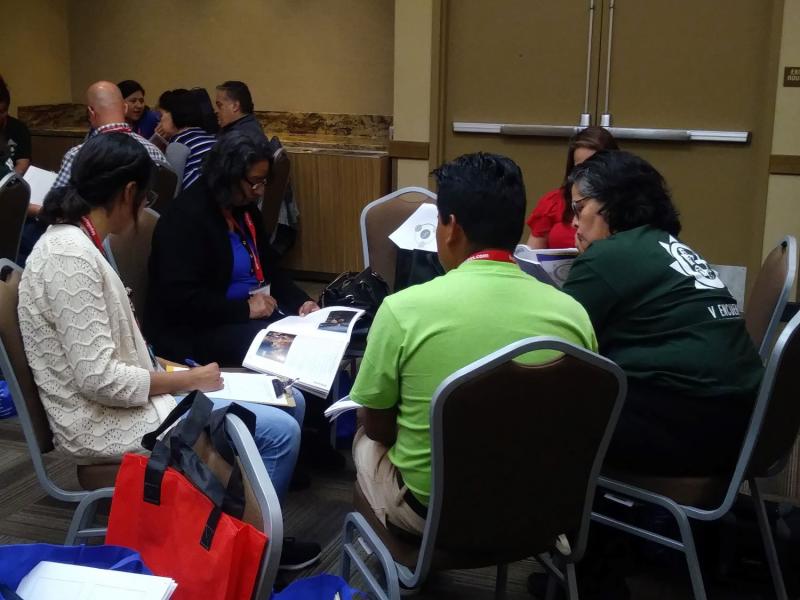
Lee esta reflexión en español.
In the past four years I have immersed myself in the study of faith-based restorative justice practices for pastoral ministry in the Latino/Hispanic community. I have been deeply troubled and challenged by the gap that exists between the growing presence of Latino/Hispanic people impacted by the criminal justice system and the shortage of faith-based resources.
There is a dire need to serve this community with restorative ministries that are culturally competent, evidence-based, and trauma informed.
After witnessing the severity of this need, there were three movements of the Holy Spirit that deeply transformed my heart, opened my eyes, and challenged me to do more.
The first movement involved hearing the stories of immigrant brothers and sisters that I have met in ministry, who have confided in me painful, personal experiences with the criminal justice system. Lack of support, resources, and general understanding of the rights to fair representation are common adversities in their stories. Additionally, the stigma of having a family member incarcerated is very present and demonstrates the lack of space in our parishes or ministries to open up our hearts, leaving families to suffer alone.
The second movement occurred during my participation in the V Encuentro Regional Meeting for Latino/Hispanic Ministry in Visalia, CA. Over 1300 Latino/Hispanic Catholic leaders and 22 bishops from the states of California, Hawaii, and Nevada gathered to reflect on the most important issues facing this community.
I had the honor to facilitate the session on care of the incarcerated and detained, also called “detention ministry.” The participants of this session included seasoned Latino/Hispanic parish leaders who volunteered in the jails and detention centers and passionate young community organizers trying to reform the criminal justice system. Together they established clear recommendations that emphasized spiritual formation and the incorporation of restorative practices.
To my surprise, only 3% of leaders in attendance joined this session, and only two other regions (out of 14) in the U.S. hosted a session in this ministerial area. There is a clear contrast, within the Catholic Church, between resources, expertise, and ongoing advocacy devoted to accompanying those impacted by immigration law versus those impacted by criminal law.
The third transformational movement of the Spirit started after I attended the National V Encuentro Meeting in Grapevine, Texas. I took the learnings from the session that I facilitated previously and shared the experience with colleagues and organizations across the country. I soon learned that not only are faith-based restorative justice resources for the Latino/Hispanic community challenging to find, but that there are very few practitioners for the level of need. In my region alone, it is estimated that 66% of Catholics are Hispanic/Latino. Our families — and especially our young people — are being equipped with tools and resources to respond to an immigration related arrest, but not to understand how to interact with the criminal justice system. A 2019 forum from the UCLA School of Law explored the experiences of the Latino/Hispanic community with the criminal justice system, and found that we are still in need of more data to comprehend the real scope of the stories that live with our people — many of which are laced with discrimination and racism.
In conclusion, we are in urgent need of pastoral projects that aim to help the Latino/Hispanic community navigate the Criminal Justice System in the U.S. There is a particular need for our Church to focus on restorative justice and how it is deeply connected with our Catholic faith and tradition of restoring relationships with God and one another. It is through such practices that true healing can begin to occur in these communities; especially for those who have been impacted in any way by the criminal justice system, those impacted by crime, and the community that holds them.
On November 2, 2022 we will offer some insights and best practices as part of the V Encuentro Ministerial Series that will be hosted online in both English and Spanish. All are welcome to participate!
Se necesitan urgentemente prácticas restaurativas para la comunidad latina/hispana
En los últimos cuatro años me he sumergido en el estudio de las prácticas de justicia restaurativa basadas en la fe dentro del ministerio pastoral en la comunidad latina/hispana. Me ha preocupado y desafiado profundamente la brecha que existe entre la creciente presencia de personas latinas/hispanas afectadas por el sistema de justicia penal y la escasez de recursos basados en la fe.
Hay una gran necesidad de servir a esta comunidad con ministerios restaurativos que sean culturalmente competentes, basados en evidencia de mejores prácticas que funcionen y que usen un marco referencial que incluye las dinámicas que deja el trauma.
Después de presenciar la severidad de esta necesidad, hubo tres movimientos del Espíritu Santo que transformaron profundamente mi corazón, abrieron mis ojos y me desafiaron a hacer más.
El primer movimiento fue el escuchar las historias de hermanos y hermanas inmigrantes que he conocido en mi caminar, quienes me han confiado experiencias dolorosas y personales con el sistema de justicia penal. La falta de apoyo, recursos y comprensión general de los derechos a una representación justa son adversidades comunes en sus historias. Además, el estigma de tener un familiar encarcelado está muy presente y demuestra la falta de espacios en nuestras parroquias o ministerios para abrir nuestros corazones, lo que deja a las familias sufriendo solas.
El segundo movimiento ocurrió durante mi participación en el V Encuentro Regional para el Ministerio Latino/Hispano en Visalia, CA. Más de 1300 líderes católicos latinos/hispanos y 22 obispos de los estados de California, Hawái y Nevada se reunieron para reflexionar sobre areas eclesiales y de servicio más importantes que enfrenta esta comunidad.
Tuve el honor de facilitar la sesión sobre el cuidado de los encarcelados y detenidos, también llamado “ministerio de las cárceles”. Los participantes de esta sesión incluyeron líderes parroquiales latinos/hispanos experimentados que sirven como voluntarios en las cárceles y centros de detención. Tambien tuvimos a apasionados organizadores comunitarios jóvenes que intentan reformar el sistema de justicia penal. Juntos establecieron recomendaciones claras que enfatizaron la formación espiritual y la incorporación de prácticas restaurativas como necesidades urgentes.
Para mi sorpresa, solo el 3% de los líderes que asistieron al encuentro regional se unieron a esta sesión, y solo otras dos regiones (de 14) en los EE. UU. organizaron una sesión en esta área ministerial. Existe un claro contraste, dentro de la Iglesia Católica, entre los recursos, la experiencia y la defensa continua dedicada a acompañar a las personas afectadas por la ley de inmigración versus a los recursos que se invierten para apoyar a las personas afectadas por la ley penal.
El tercer movimiento de transformación del Espíritu comenzó después de asistir a la Reunión Nacional del V Encuentro en Grapevine, Texas. Tomé los aprendizajes de la sesión que facilité anteriormente y compartí la experiencia con colegas y organizaciones de todo el país. Pronto aprendí que no solo son difíciles de encontrar los recursos de justicia restaurativa basada en la fe para la comunidad latina/hispana, sino que hay muy pocos profesionales para el nivel de necesidad que existe. Solo en mi región, se estima que el 66% de los católicos son hispanos/latinos. Nuestras familias, y especialmente nuestros jóvenes, están siendo equipados con herramientas y recursos para responder a un arresto y potencial deportación relacionado con inmigración, pero no para comprender cómo interactuar con el sistema de justicia penal. Un foro de 2019 de la Facultad de Derecho de UCLA exploró las experiencias de la comunidad latina/hispana con el sistema de justicia penal y descubrió que todavía necesitamos más datos para comprender el alcance real de las historias que viven con nuestra gente: muchas de los cuales están impregnados de discriminación y racismo.
En conclusión, tenemos una necesidad urgente de proyectos pastorales que apunten a ayudar a la comunidad latina/hispana a navegar el sistema de justicia penal en los EE. UU. Existe una necesidad particular de que nuestra Iglesia se centre en la justicia restaurativa y nos ayude a entender cómo está profundamente conectada con nuestra fe y la tradición de restaurar las relaciones con Dios y entre nosotros. Es a través de tales prácticas que la verdadera sanación puede comenzar a ocurrir en estas comunidades; especialmente para aquellos que han sido afectados de alguna manera por el sistema de justicia penal, aquellos afectados por el crimen y la comunidad que los retiene podamos avanzar con fe y en solidaridad.
El 2 de noviembre de 2022 ofreceremos algunas ideas y mejores prácticas como parte de la Serie Ministerial del V Encuentro Latino/Hispano que se realizará en línea tanto en inglés como en español. Todos y todas están invitados!


